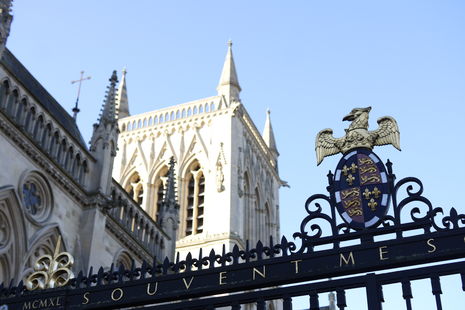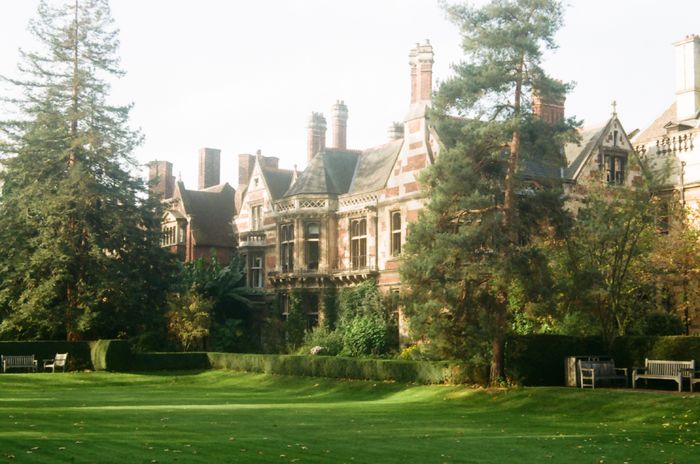Cambridge’s fortress mentality
From being unable to walk through King’s to the dubiously meritocratic admissions system, Tom Gregory attacks what he sees as the fortress mentality fostered by the collegiate university

It’s five to twelve, I have a class at twelve. It’s raining. I’m on King’s Parade, I need to be at Sidgwick. I would quite like to go the direct (and more scenic) route through King’s college, but, alas, it’s the quiet period now, so I’m told that students from other colleges cannot use King’s as a through route.
I was wondering what the reason might be this time, for surely the Covid excuse had to tire at some point. It turns out, rather conveniently, that Covid went away just in time for the quiet period to start. But this didn’t apply to the tourists, of course, who, queuing in their glaring yellow coats, joyfully awaited the opportunity to catch a wild Cambridge student in its natural habitat.
I struggled to hide my indignation as I gave the porter a Paddington stare. Yes, I understood that these tourists had paid £10 to visit the college, but I think they might have forgotten I was paying £9,250 on an annual basis. I was also confused, because I had been told by friends that King’s was now open to anyone with a Camcard, and, when I checked later, I could find no evidence of the quiet period preventing students from accessing the college.
“Guarded like fortresses from outside, the rules for access are always obscured, varied, never fully understood”
This reflects precisely what is most infuriating about the Cambridge college system. Guarded like fortresses from outside, the rules for access are always obscured, varied, never fully understood, and even when you need to be in a particular college, there’s often the sentiment that you’re not ‘supposed’ to be there. Porters take advantage of this ambiguity, choosing their own rules arbitrarily in an exploitative power grab. We see this shockingly exemplified in instances of racism directed at students, such as when a St Catherine’s porter physically prevented a black student from entering college.
And it’s not just a matter of being denied access to college grounds, although I do think that does have an important role in fostering a sense of belonging in an often alienating place. This exclusion is also relevant to things that pertain directly to our oh-so-sacred degrees, like library book access. I can’t help but notice that the library collection at my college, Homerton, doesn’t quite match that of Trinity. And yet if I need a book that is only at Trinity I have to jump through hoops, reach out to librarians, hope that I can gain access to the building. Why? There are simple solutions to this. If there were concerns about college libraries becoming crowded, could there not just be a simple condition of needing to take out or return a book in order to visit a library at another college?
The truth is that there is little motivation to enact necessary changes because Cambridge is founded upon denying access, preventing accessibility in order to manufacture an allure of exclusivity. This is self-evident in the university admissions process, where we face the supposedly meritocratic hurdles of admissions tests and interviews. But the excuse of meritocracy holds no ground once students have arrived at the university - yet the attitude of exclusivity through exclusion persists.
“The college system enables the fabrication of a facade of exclusivity”
Indeed, the sharp discrepancies between the finances of each college enable stark differences in both the quality of teaching and student life. With supervisors paid by college, the number of supervisions offered for a student of the same subject at different colleges can vary significantly. As a result, students at less wealthy, less prestigious colleges (who are disproportionately more likely to come from a state educated background) risk experiencing a lower quality of education once they arrive at the university. Moreover, reduced financial aid at poorer colleges means that day-to-day concerns about making ends meet can have much greater sway in the lives of students at those colleges – worsening their university experience and harming their potential to succeed.
And thus, we see that the college system enables the fabrication of a facade of exclusivity, privileging students not on any meritocratic basis, but in an arbitrary way that upholds existing systems of inequality. And once admitted behind this rich velvet curtain, we are expected to feel grateful, and to uphold and perpetuate it with nationalistic pride for our college.
In its pursuit of this allure, in the construction of a fortress mentality, Cambridge, with its closed-off, ivory towers known as colleges, has forgotten the importance of spreading knowledge, both among its undergraduates and more broadly – and if that isn’t the entire purpose of academia, what is?
 News / Hundreds of Cambridge academics demand vote on fate of vet course20 February 2026
News / Hundreds of Cambridge academics demand vote on fate of vet course20 February 2026 News / Judge Business School advisor resigns over Epstein and Andrew links18 February 2026
News / Judge Business School advisor resigns over Epstein and Andrew links18 February 2026 News / University Council rescinds University Centre membership20 February 2026
News / University Council rescinds University Centre membership20 February 2026 News / Petition demands University reverse decision on vegan menu20 February 2026
News / Petition demands University reverse decision on vegan menu20 February 2026 News / Caius students fail to pass Pride flag proposal20 February 2026
News / Caius students fail to pass Pride flag proposal20 February 2026










